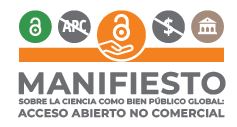Business and Cultures: The Value of Interculturalism
DOI:
https://doi.org/10.5281/zenodo.10156882Keywords:
interculturalism, organization, internationalizationAbstract
Interculturalism and the management of human resources has been one of the first challenges of any company wishing to work and develop activity in other regions. The various movements of goods, services, human resources and technology have implicated phenomena of culture exchange worldwide. International trade is a special case in general, it has the same principles as internal trade, but it suffers from certain changes caused by barriers such as, geography, economy and interculturalism. The objective is to understand how we can accept and cultivate the cultural differences in society.
Downloads
References
Andevski, Milica y Arsenijeviæ, Jasmina (2012). Competences of employees in education. Visoka škola strukovnih studija za vaspitaèe “Mihailo Palov”. Año 2, No. 1: Pp. 29-50.
Baligh, Helmy (2006). Organization structures: Theory and Design, Analysis and Prescription. Springer Editions. Geneva, Switzerland.
Black, Stewart y Mendenhall, Mark (1989). Cross-Cultural Training Effectiveness: A Review and a Theoretical Framework for Future Research. The Academy of Management Review. Año 1, No.15: Pp. 113-136.
Cuche, Denys.(2004). La notion de culture en sciences sociales. Open Edition Journal. Año 3, No. 26: Pp. 215- 228.
Demil Xavier, Lecocq Xavier, Warnier Vanessa (2013). Stratégie et Business Models. Pearson Education. Paris, France.
Dimitrova, Annah. (2006). Le jeu entre le local et le global : Dualité et dialècte de la globalisation. Documento en línea. Disponible en: http://journals.openedition.org/socio-anthropologie/440.pdf. Consulta el 15/03/2020.
Fornet Betancourt, Raúl. (2000). Interculturalidad y globalización. IKOVerlag fürinterkulturelle Kommunikation (Frankfurt) Departamento Ecuménico de Investigaciones. San José, Costa Rica.
Fornet-Betancourt, Raúl. (2001). Transformación intercultural de la filosofía. Editorial Desclée De Brouwer. Madrid, España.
Gertsen, Martine (2006). Intercultural competence and expatriates . International Journal of Human Resource Management. Año 3, No. 1: Pp. 341-363.
Hall, Edward (1990). Guide du comportement dans les affaires internationales. Allemagne, Etats-Unis, France. Éditions Broché. Paris, France.
Hofstede, Geert (2007). Culture et organisations. Éditions Broché. Paris, France.
Le Boterf, Guy (2010). Repenser la compétence pour dépasser les idées reçues. Éditions Broché. Paris, France.
Molinsky, Andrew (2007). Cross-Cultural Code-Switching: The Psychological Challenges of Adapting Behavior in Foreign Cultural Interactions. The Academy of Management Review. Año 32, No.2: Pp. 622-640.
Tung, Rosalie (1993). Managing cross-national and intra-national diversity. Human resource management. Año 4, No. 32: Pp. 461-477.
Downloads
Published
How to Cite
Issue
Section
License
Copyright (c) 2020 Universidad Alonso de Ojeda

This work is licensed under a Creative Commons Attribution-NonCommercial-ShareAlike 4.0 International License.
All content of Ethos Journal will be free access, distributed under the Creative Commons license (BY-NC-SA).




